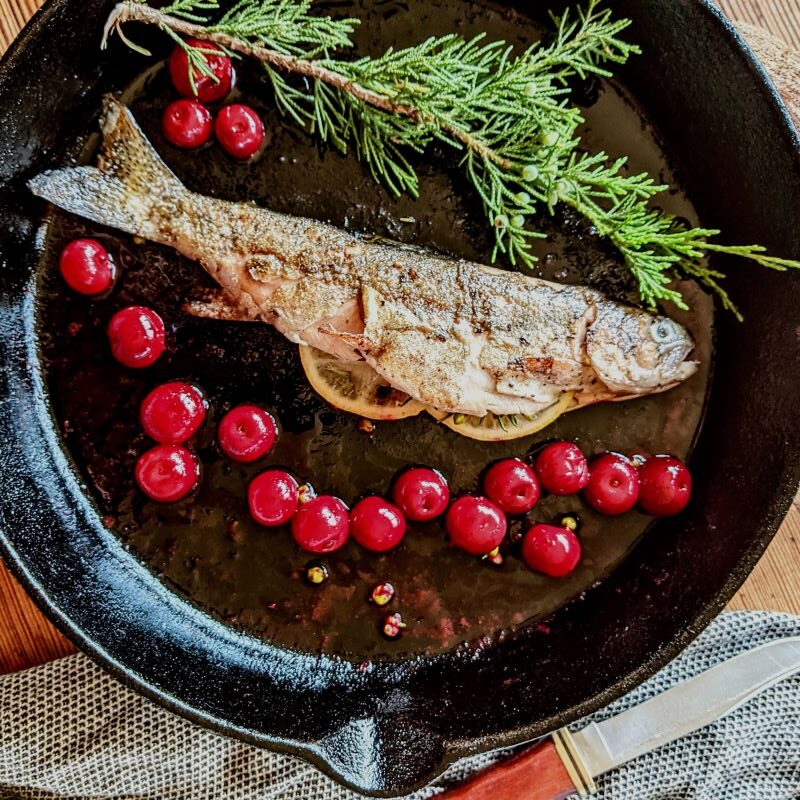
Wild Brook Trout with Crushed Juniper Berries

By Alison Steele
Our summers in Virginia start religiously with a getaway to the coast along with family, fresh oysters, blue crab, and swimming. It’s relaxing to see the kids play fearlessly in the Atlantic Ocean flanked by dolphins and warmed by the southern sun.
After a week or two we make our way inland to the mountains and unwind along the rivers and streams, swimming, kayaking, and fishing. Virginia cousins are a foot taller, and Granddaddy and Gigi celebrate another trip around the sun both with summer birthdays. They become the center of our universe for the summer, and we cherish our moments together.
While the kids sleep late into the morning, I walk the meadow, breathe, and marvel at the expansive countryside and what it’s happy to give. The red cedars offer young green Juniper berries and staghorn sumac its small burgundy clusters, both native to the Blue Ridge mountain regions. With the accompaniment of ripe sour cherries and lemon thyme from the garden, a colorful palate emerges from years of growing and working together.
These are the wild flavors of summer in the mountains that pair perfectly with another native food from this region…wild brook trout. The small but adaptable native trout have thrived in the cold Appalachian spring-fed streams for millions of years, “since before the ice age” and “only thrive in the cleanest of waters.” Protected by thickets of rhododendron and towering oak and pine, deep in the hollows in the smallest of headwater tributaries, these fish, like many native fauna, are indicators of the ecological health of the ‘small water’ winding through the mountains. Indigenous cultures would set up camps along the creeks to catch and smoke what they could when the water levels were high from rainfall.

The biggest threat to these small native fish is the introduction of aggressive non-native brown trout that compete for food and spawning sites along the rivers. A good angler will know which creeks are stocked with non-natives and which are still wild and protected. If you’re lucky, the old-timers will let you in on the good fishing holes up and down the creek, especially if you’re kin!

Riparian vegetation removal, dam constructions, and low water levels from lack of rain all lead to habitat degradation. The good news is, like mountain folk, the southern Appalachian brook trout are resilient and can adapt to their ever-changing environment. With some care, education, management, and respect our children’s children will be able to fish and eat wild brook trout like their ancestors did.


Wild Brook Trout with Crushed Juniper Berries
Brook Trout, gutted and soaked overnight in well water
For each fish:
2 slices of lemon
1 T young green juniper berries, lightly crushed
3 sprigs of thyme
Staghorn Sumac Salt
Fresh cracked pepper
2 T grass-fed butter
2 T oil for pan-frying
Handful of sour cherries
Sumac Salt
4 T staghorn sumac berries
2 T sea salt
Grind with a mortar and pestle until coarse
Pat the fish dry. Stuff with lemon slices and a few fresh sprigs of thyme and juniper. Heat skillet over medium-low heat. Add the oil and butter then crushed juniper berries. If using electric heat it may take a bit longer to get the skillet hot. Lay the fish on the berries and generously season with salt and freshly cracked pepper. Pan fry over medium-low heat for 2-4 minutes depending on the size of the fish. Gently flip, season, and repeat.

Throw in a large handful of sour cherries to cook alongside the buttery juniper berries, herbs, and fish. Once crisp and cooked throughout, discard the lemon and herb stuffing. Remove the backbone and tiny pin bones before eating. Squeeze fresh lemon and spoon warm tart cherries and juniper berries over the fish making sure there’s a crushed juniper berry in every bite. My taste buds tell me that Juniper berries and brook trout are an ancient pairing the minute they touch my tongue. A match made in heaven with seasonal herbs and tart fruit.
Savor hot!
A native of Virginia, Alison Steele lives with her husband, two children, and cat in Boulder Creek where she raises quail, chickens, fruit trees, vegetables, and herbs. Alison plays banjo and sings in Sugar by the Pound.
(Photos by Alison Steele)









